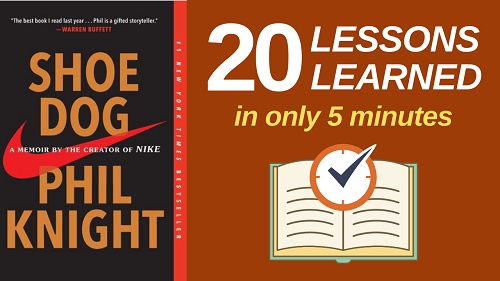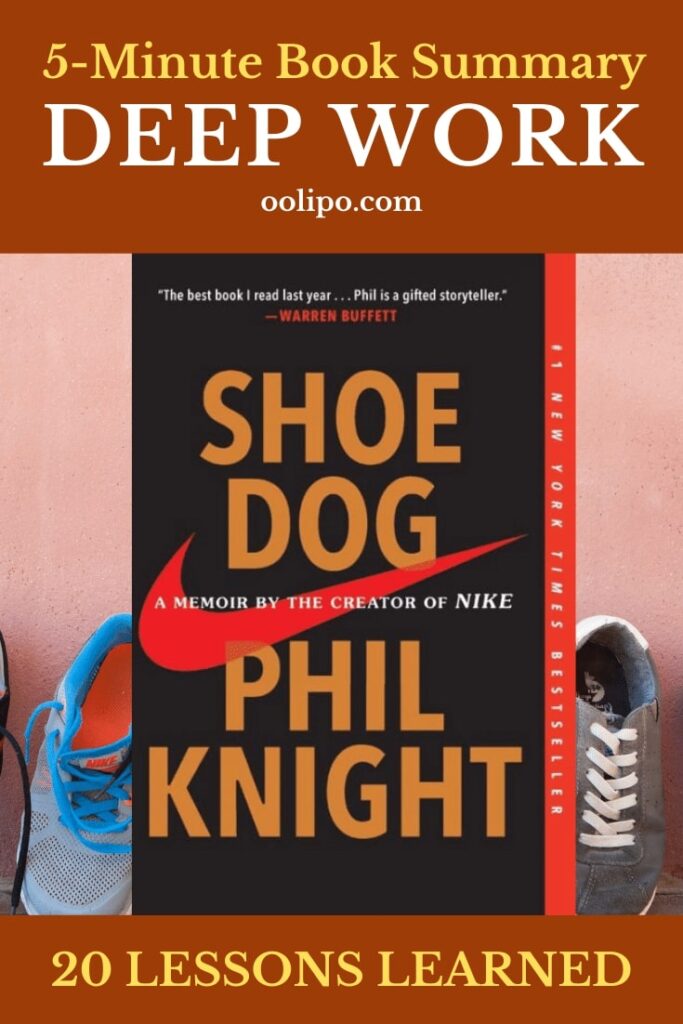There are few brands as recognizable as Nike. They are well-known for their engaging marketing campaigns that focus heavily on storytelling. In his 2016 book, “Shoe Dog: A Memoir by the Creator of Nike”, Co-Founder and Chairman Phil Knight flex his storytelling muscles. This Shoe Dog summary reveals valuable lessons that Knight learned through his experiences during his captivating and interesting personal journey.
In 1962, Phil Knight saw an opportunity while he was in college working on his MBA. He saw the rise in popularity of Japanese cars and wondered if the same could be done with athletic footwear.

With the idea of importing high-quality, low-cost shoes, he took his first international trip to Japan and borrowed money from his father to import Tiger shoes. This decision led to the birth of Blue Ribbon Sports, and his partnership with track and field coach, Bill Bowerman.
The memoir explores the challenges Knight faced with his exporters, which would lead to Knight and Bowerman to manufacture their own shoes, the creation of Nike, their iconic “swoosh”, and the expansion into clothing. In 1980 Nike took the opportunity to go public to astounding success, making Knight worth $178 million overnight.
Shoe Dog Summary and 20 Lessons Learned
#1 Chase a calling, not a career
As Nike was a growing company, Knight made almost no profit, his business struggled, and faced bankruptcy many times. He had an MBA from Stanford University and left a full-time career as an accountant to sell shoes out of the trunk of his car. He had to follow his passion – his calling. He felt it was important that the work he spent his life on needed to feel meaningful, purposeful, and creative.
#2 Pursue your “crazy idea”
When Knight was in college in the early 1960s, the athletic shoe industry was dominated by German companies Adidas and Puma. Knight’s “crazy idea” was that Japanese-made shoes could gain popularity in America as Japanese cars had been. He pursued his idea, and eventually found great success.
#3 Success does not come easily
Looking at Nike as an athletic apparel and equipment giant now, it is hard to imagine that the success they have now, was not easy or instant. Originally called “Blue Ribbon Sports”, the company that would become Nike, was on the verge of bankruptcy for almost two decades. Knight faced challenges acquiring funding, landing orders on time, and difficulties with manufacturers throughout the early days and pushed through to find the accomplishment that Nike has today.
#4 Failure is an opportunity
Knight openly acknowledged that starting a business was risky, and he was willing to face that risk. He felt that failure would gain him wisdom, and wisdom is an intangible asset. Failure is an opportunity to learn and do better next time. Knight has said in the past that if he had failed, he would have just tried again with more wisdom.
#5 There is value in quality
Knight started his journey with the desire to import high-quality, low-cost shoes and Nike consistently focused on the quality of their shoes and were constantly innovating ways to improve them. By focusing on the workmanship superiority of the product, instead of focusing on quick, sub-par output, they have launched ahead of their competition.
#6 “Advertising” takes many forms
Traditional advertising was not favored by Knight. In “Shoe Dog”, Knight goes into detail about not seeing the value, or benefit from investing in large ad campaigns. Knight valued publicity and focused on signing popular athletes to become brand representatives for Nike. These iconic athletes increased public awareness of Nike and the plan was a huge victory for the brand.
#7 Learn from your competition
Nike and Adidas have a well-established brand rivalry. Knight looked to Adidas as inspiration, but also as their main competitor. He felt Adidas was arrogant and had a negative view of them, but that did not stop him from learning from them. For example, Jesse Owens famously wore Adidas to the 1937 Olympics, Nike outfitted Steve Prefontaine for the 1972 Olympics, and his official endorsement in 1974 was overwhelmingly effective for the company.
#8 Improve where improvements can be made
It is no secret that Nike shoes are manufactured offshore. Knight was inspired by the fact that his shoes would be Japanese-made. Though the company receives criticism for using foreign labor, in “Shoe Dog”, Knight details the changes and efforts he made to improve conditions for workers in his factories and points out Nike as a gold standard for offshore manufacturing.
#9 Give credit where credit is due
An interesting observation can be made in “Shoe Dog” and that is Phil Knight gives credit to the employees that supported Nike through its growth and recognizes them enormously for helping the company to grow and succeed.
#10 Trust your team
Knight was very well-read and enjoyed learning about leadership. He observed that none of the great leaders of history micromanaged their teams. They did not tell people how to do things, they would tell them what to do, and trust them to get it done. This resulted in Knight hiring people with passion and ability and allowing them to solve problems on their own.
#11 Perseverance pays off
Knight acknowledges that “never give up” is an overstated piece of advice. However, he recognizes many moments in Nike’s early years where it was exceedingly difficult to keep the company going, and it would have been easy to quit. Pushing through those challenges has earned him the success that Nike has today.
#12 A massive project is just many small projects
It is easy to feel unproductive when you view a task as a huge project. When you break that project down into small goals and success markers, it becomes a lot easier to manage, and the little amount you complete each day, adds up until the job is done.
#13 Act successful until you become successful
In the early days of Blue Ribbon Sports, Knight gained success by projecting confidence and success. He had to participate in many meetings and business deals with experienced and essential business people, and by acting successful, he eventually became successful.
#14 Travel to gain experience and wisdom
In “Shoe Dog”, Knight goes into great detail about how his world travels expanded his knowledge and viewpoints. He values the wisdom that he gained from his travel as a young man and is a proponent of young people (with the means to do so) traveling as much as they can before they settle into careers.
#15 Success has an element of luck
Of course, “Shoe Dog” is a memoir, and a large focus is placed on the hard work, dedication, and perseverance that it took for Knight to grow Nike to what it is today. However, Knight also acknowledges that luck played a role in his success. Hard work, dedication, and perseverance play a role in providing more opportunities for luck.
#16 Understand the importance of storytelling
Knight demonstrates very well in “Shoe Dog” that storytelling is a powerful tool. There is a history of Nike’s most effective and famous ad campaigns coming from a place of storytelling. Engaging your audience will have a profound effect on your marketing and brand.
#17 Know your audience
Like all lucrative business owners, Knight understands the importance of knowing who Nike’s audience was. Having this information, and fully understanding it gives you the tools you need to create products, marketing, and branding that resonate with those intended to experience it.
#18 Your brand needs to inspire
A brand cannot gain public support if the goal of the business is to grow fiscally. Brands must have a mission that the public can agree with and get behind. Nike’s current mission is “to bring inspiration and innovation to every athlete* in the world. *If you have a body, you are an athlete.” This statement features prominently on their website and aligns with Knight’s understanding of the need for a deeper purpose.
#19 Delivery trumps perfection
Knight’s focus was always on the quality and performance of his products, however, delivering his orders on time was more important to him. In the early stages of importing his shoes, there were often times they struggled to receive their orders on schedule. The quality of a product is irrelevant if your customers can not trust you to deliver it on time consistently.
#20 Life is about growth
In “Shoe Dog”, Phil Knight said, “Life if growth. You grow or you die.” His life revolved around the concept that growth was the most important thing in his life. He risked everything, on multiple occasions, to grow Nike into the company we know today, and took extraordinary measures to pursue personal growth through his study, reading, and travels. Growth and life are one and the same for Knight.
Top 10 Quotes from the Shoe Dog Book
- “Like it or not, life is a game.”
- “History is one long processional of crazy ideas.”
- “The single easiest way to find out how you feel about someone. Say goodbye.”
- “Don’t tell people how to do things, tell them what to do and let them surprise you with their results.”
- “The single easiest way to find out how you feel about someone. Say goodbye.”
- “Life is growth. You grow or you die.”
- “When you see only problems, you’re not seeing clearly.”
- “Put it this way. The harder you work, the better your luck.”
- “How can I leave my mark on the world, I thought, unless I get out there first and see it?”
- “Beating the competition is relatively easy. Beating yourself is a never-ending commitment.”
Free PDF Download of Shoe Dog Summary to Save or Print
We created a PDF file with the summary and quotes on this page for easy access: Download Shoe Dog PDF Summary. If you want to buy the paperback version of the book, check out this page.
Writers! Have you ever wondered what keywords would perform best for your book? Or what categories you should use for your book? Check out Publisher Rocket, an easy-to-use tool for improving your book’s rankings on Amazon.
Phil Knight’s Top 10 Rules For Success
Please share these important lessons by pinning this post to Pinterest.
